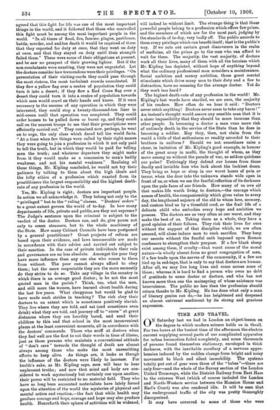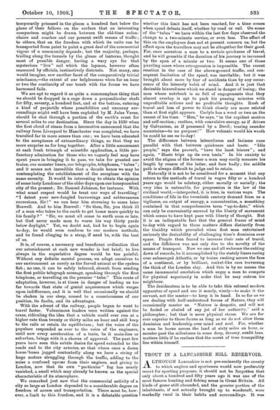TIME AND TRAVEL.
ON Saturday last we had in London an object-lesson on the degree to which modern science holds us in thrall. For two hours at the busiest time of the afternoon the electric current supplying several parts of our complicated apparatus for urban locomotion failed completely, and some thousands of persons found themselves stationary, enveloped in thick darkness, with the inevitable corollary of a nervous appre- hension induced by the sudden change from bright and noisy movement to black and silent immobility. The systems totally put out of gear were three of the "tubes "—there are only four—and the whole of the Surrey section of the London United Tramways, while the District Railway from East Ram to the extreme West (which of course included the London and North-Western service between the Mansion House and Earl's Court) was also rendered idle. It will be seen that the underground traffic of the city was pretty thoroughly disorganised.
It may have occurred to some of those who were
temporarily prisoned in the gloom a hundred feet below the plane of their fellows on the surface that an interesting comparison might be drawn between the old-time sedan- chairs and coaches and our present swift means of traffic ; to others, that on the freedom with which its units can be transported from point to point a great deal of the commercial vigour of a community depends; but the majority, perhaps, trailing along the tunnels by the gleam of lanterns, thought most of possible danger, having a wary eye for that mysterious "live" rail which the layman, however often reassured by officials, instinctively distrusts. Not many, one would imagine, saw another facet of the comparatively trivial mischance,—the extent of our helplessness when for an hour or two the continuity of our touch with the forces we have harnessed fails.
We are apt to regard it as quite a commonplace thing that we should be dropped in a cage down a perpendicular shaft for fifty, seventy, a hundred feet, and at the bottom, entering a kind of projectile whose possibilities and uncanny sur- roundings might well have been exploited by M. Jules Verne, should be shot through a portion of the earth's crust for several miles to our destination. Since the day in 1830 when the first cloud of steam from a locomotive announced that the railway from Liverpool to Manchester was completed, we have travelled far in more senses than one ; we have been educated to the acceptance of extraordinary things, so that they no more surprise us for long together. After a little amazement at each fresh triumph of scientific application, a little per- functory admiration for those who we vaguely feel may have spent years in bringing it to pass, we take for granted our trains, our monster liners, our telegraphs, telephones, " tubes "; and it seems not incredible that a decade hence we may be contemplating the establishment of the aeroplane with the same serenity. It would be interesting to obtain the opinion of some lusty Londoner of the older days upon our honeycombed city of the present ; Dr. Samuel Johnson, for instance. With what scant respect would he treat our ways of travelling ! "I detest your new-fangled burrowings and subterranean excursions, Sir!" we can hear him storming to some later Boswell. And to him Boewell : "So then, Sir, you think ill of a man who takes to the earth to get home more quickly to his family?" "Sir, we must all come to earth soon or late, but God never made man to worm his way thirty yards below daylight." 'Yet, we doubt not, had he to begin again to-day, he would soon conform to our modern methods, and be found clinging to a strap, if need be, with the best of us.
It is, of course, a necessary and beneficent ordination that our astonishment at each new wonder is but brief; to live always in the superlative degree would be too painful. Without any definite mental process, we adapt ourselves to our environment as surely as the furred animal or the eyeless fish ; no one, it can be safely inferred, shrank from sending the first public telegraph message, speaking through the first telephone, or -travelling on the premier "tube." This route of adaptation, however, is at times in danger of leading us too far towards that state of genial acquiescence which verges upon indifference, and it is well that occasionally we should be shaken in our sleep, roused to a consciousness of our position, its faults, and its advantages.
With the advent of the railway, people began to want to travel faster. Voluminous leaders were written against the craze, ridiculing the idea that a vehicle could ever run at a 'higher rate than twenty or thirty miles an hour and still keep to the rails or retain its equilibrium ; but the voice of the populace responded as ever to the voice of the engineers, Until now every acceleration of a train, be it main-line or suburban, brings with it a chorus of approval. The past few years have seen this subtle desire for speed extended to the roads and to the city arteries, so that where once a dozen horse-'buses jogged contentedly along we have a string of huge motors struggling through the traffic, adding to the noise a confused uproar from their engines, and giving to London, now that its own "particular" fog has nearly vanished, a smell which may already be known as the special characteristic of its atmosphere.
We remarked just now that the commercial activity of a city so large as London depended to a considerable degree on freedom of access and transportation. There must be, how- ever, a limit to this freedom, and it is a debatable question whether this limit has not been reached, for a time comes when speed defeats itself, whether by road or rail. On some of the "tubes " we have within the last few dap observed the change to a two-minute service, or even less. The effect of this on the employees does not at present concern us, but the effect upon the travellers may not be altogether for their good.
For, once accustom a man to a certain quickness of travel, and he will grumble if the duration of his journey is increased by the span of a minute or two. It seems one of those puzzling cases where retrogression is impossible. The recent reaction in the case of the above-ground traffic, and con- sequent limitation of the speed, was inevitable; but it was brought about more by fear of accidents than by any recur- rence of the leisurely habit of mind. And it is just that desirable leisureliness which we stand in danger of losing; the man whose notebook is so full of engagements that they almost overlap is apt to pack his passing minutes with unprofitable actions and no profitable thoughts. Rush of travel and loss of power to think closely are more related than at first sight appears. Carlyle has a word or two on the unrest of his time. " Men," he says, " in the rapidest motion and self-motion ; restless, with convulsive energy, as if driven by Galvanism, as if possessed by a Devil ; tearing asunder mountains—to no purpose !" How volcanic would his wrath be could he see us to-day !
The difference between leisureliness and laziness runs parallel with that between quickness and haste. "Idle people," says the proverb, " have the least leisure" ; and again, " Haste trips up its own heels." In his anxiety to avoid the stigma of the former a man may easily measure his length by reason of the latter, and fare badly ; the middle path is always difficult to judge and to retain.
Naturally it is not to be considered fora moment that any return to the methods of travel in vogue fifty or a hundred years ago would be salutary, either morally or socially ; the very idea is untenable, for progression is the law of the civilised world,—interpreted, it is true, in various ways. The conditions of life in the twentieth century demand from us a vigilance, au output of energy, a concentration, a something contained in that comprehensive term "up-to-date," which can only be conveniently secured by the liberty of movement which seems to have kept pace with liberty of thought. But it is an indisputable fact that the general frame of mind to-day with regard to these matters differs distinctly from the timidity which prevailed when first man entertained seriously the desirability of challenging time's dominion over space. People then feared to increase their rate of travel, and the diffidence was not only due to the novelty of the means of transport. Now we one and all welcome the cutting down of records, be it accomplished by the stately liners racing over submerged Atlantis, or by trains rushing across the face of a continent, or by brilliant, rocket-like cars traversing the thick of the London clay. And this is by no means the same immemorial emulation which urge a man to compete for physical superiority in order that lie may outrun his neighbour.
The desideratum is to be able to take this colossal modern apparatus of speed and use it sanely, wisely—to make it the servant, not the master—to keep it in hand. In so far as we are dealing with half-understood forces of Nature, they will occasionally master us. " Nature is despotic, and will not be fooled or abated of any jot of her authority," said a philosopher ; but that is mere physical stress. We are for ever superior to those forces as long as we do not allow them dominion and leadership over mind and soul. For, wheal!z a man be borne across the land at sixty miles an hour, oz saunter past the milestones in some deep, dreamy, sunlit lane, matters little if he realises that the secret of true tranquillity lies within himself.















































 Previous page
Previous page